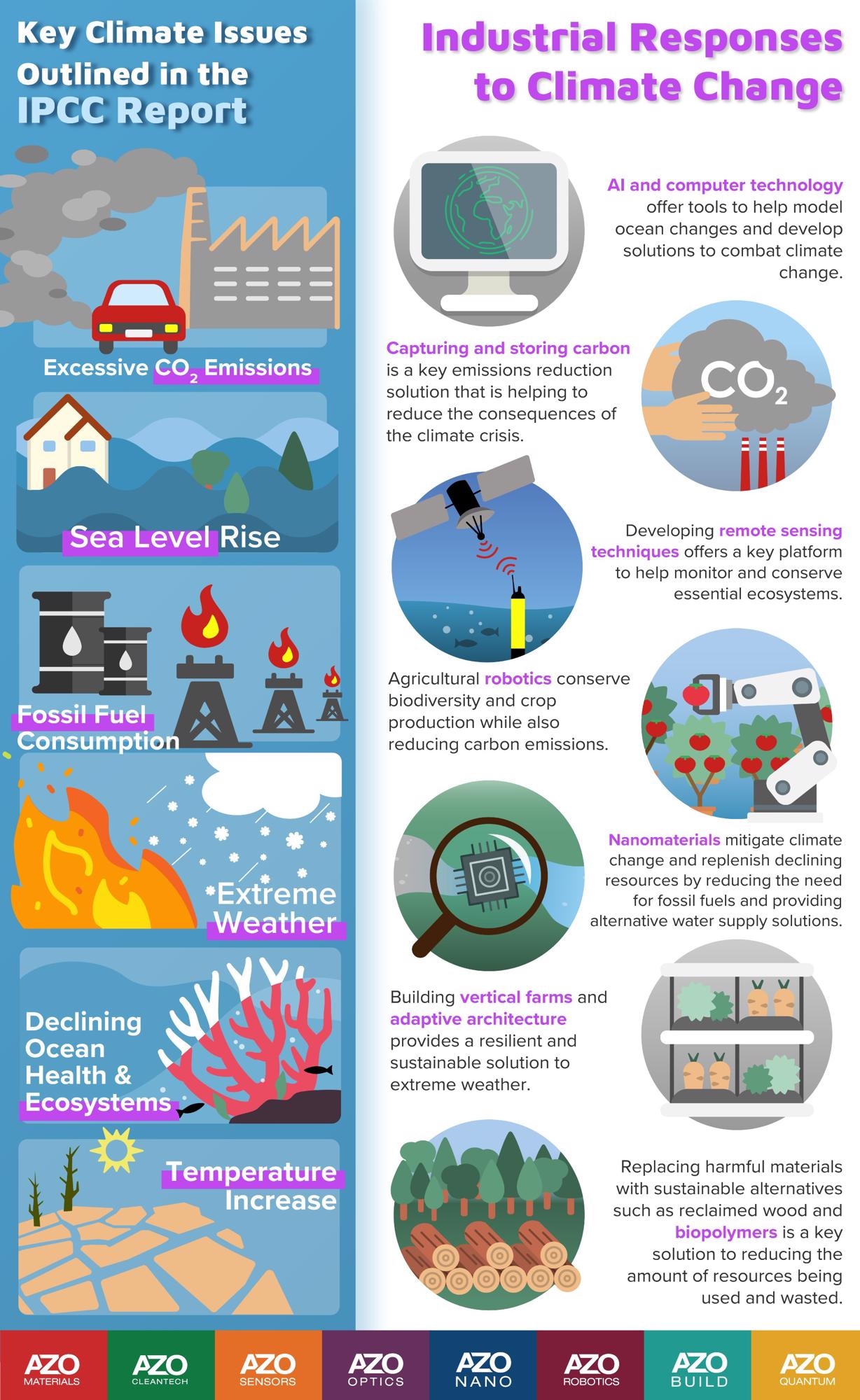
The nanotechnology industry is growing at a rapid pace, with innovations influencing a new generation of technology. Harnessing this potential is crucial to overcoming some of the most significant climate change issues.
By 2018, global temperature had already increased by 1.5 ◦C. That year in acknowledgment, the Intergovernmental Panel for Climate Change (IPCC) released a special report detailing this change's adverse effect on the climate system. Stark warnings about the necessity to cut carbon emissions from the Summary for Policymakers highlight the importance of effective, adaptive solutions to reduce the effects of global warming. : "Future climate-related risks would be reduced by upscaling and acceleration of far-reaching, multilevel and cross-sectoral climate mitigation and by both incremental and transformational adaption."
What is IPCC's Sixth Assessment Report?
Video Credit: Intergovernmental Panel on Climate Change (IPCC)/YouTube.com
Just three years later, this United Nations body has published an extended version of the report, The 2021 Physical Science Basis Summary for Policymakers. Exploring more than just global warming, this document is a long-awaited update to the IPCC's 2013 scientific review of climate change. A further temperature increase of 2 ºC by 2040, variability in vital resources such as water availability, and a predicted 2 m sea-level rise by the end of the century are just a few of the future outlooks for the planet. The cause of these consequences has also been made abundantly clear:
It is unequivocal that human influence has warmed the atmosphere, ocean and land. Widespread and rapid changes in the atmosphere, ocean, cryosphere and biosphere have occurred.
The 2021 Physical Science Basis Summary for Policymakers, IPCC, 2021
It is not enough to maintain current efforts. Anthropogenic actions have impacted every aspect of the Earth, from its climate, its resources to its ecosystems; now, these actions must adapt. Only with innovative technologies from sectors such as the nanotechnology industry can climate change mitigation be accelerated.
The IPCC Report Series
Following the release of the IPCC's newest reports, the 2018 Summary for Policymakers and 2021 Physical Science Basis, AZoNano has collated articles highlighting how developments in nanotechnology are tackling the ongoing climate crisis.
A specific advancement or adaption is explored within each article, explaining its relevance to critical issues mentioned within the IPCC reports. In doing so, a unique opportunity to consider the limitations, market relevance, and practicality of technologies that underpin the relationship between each strategy and climate change is offered.
By taking this sector-specific approach, readers are given a chance to learn more about the cutting-edge solutions hoping to re-define climate change mitigation. Throughout the series, articles will highlight the significance of technological innovation through research and development to combat this ongoing crisis.

Image Credit: Sara Lopez Segura
AZoNano's IPCC Editorial Series: Industrial Response to Climate Change highlights how adaptable solutions for harmful emissions are just as impactful for carbon neutrality as achieving a carbon dioxide circular economy. FuelGem's nanoparticle fuel additives, for example, could give hope to aviation's fossil fuel engines, enabling this industry to cut CO2 emissions without having to sacrifice existing infrastructure. Alongside this, novel research in carbon dioxide hydrogenation methodologies has shown the benefit of utilizing nano-intermetallic catalysts for improved CO2 to methanol conversion rates.
The IPCC reports have emphasized the detrimental impact of climate change on more than just global warming; vital resources are also at risk. Anthropogenic activities have aggravated the scarcity of safe water. According to the IPCC reports, global shortages are likely to be experienced by all, regardless of economic development. Novel water filtration techniques in the form of polymeric electrospun nanofibrous membranes are a promising future for replenishing water sources, but can their challenges be overcome in time to make a difference?
Adaptable solutions need to be designed by all industries at all stages to have a genuine impact in reducing climate effects. Whether it is targeting CO2 emissions at their source or ensuring resource security, the potential of nanotechnology to mitigate the effects of climate change is boundless.
References and Further Reading
IPCC, (2018) Summary for Policymakers. In: Global Warming of 1.5°C. An IPCC Special Report on the impacts of global warming of 1.5°C above pre-industrial levels and related global greenhouse gas emission pathways, in the context of strengthening the global response to the threat of climate change, sustainable development, and efforts to eradicate poverty [Masson-Delmotte, V., P. Zhai, H.-O. Pörtner, D. Roberts, J. Skea, P.R. Shukla, A. Pirani, W. Moufouma-Okia, C. Péan, R. Pidcock, S. Connors, J.B.R. Matthews, Y. Chen, X. Zhou, M.I. Gomis, E. Lonnoy, T. Maycock, M. Tignor, and T. Waterfield (eds.)]. World Meteorological Organization, Geneva, Switzerland. In Press
IPCC, (2021) Summary for Policymakers. In: Climate Change 2021: The Physical Science Basis. Contribution of Working Group I to the Sixth Assessment Report of the Intergovernmental Panel on Climate Change [Masson-Delmotte, V., P. Zhai, A. Pirani, S. L. Connors, C. Péan, S. Berger, N. Caud, Y. Chen, L. Goldfarb, M. I. Gomis, M. Huang, K. Leitzell, E. Lonnoy, J.B.R. Matthews, T. K. Maycock, T. Waterfield, O. Yelekçi, R. Yu and B. Zhou (eds.)]. Cambridge University Press. In Press.